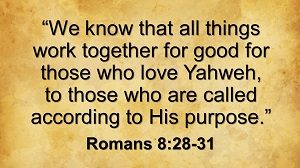People glory in many different things in this world – some in their wealth, others in their power, prestige, or fame. Still others in success, their strength or abilities, the works of their hands, wisdom, intellect, or technology, or even their favorite sports team. It’s been that way down through the ages. Some today – particularly those in the media – even seem to glory in tragedy or another person’s plight or scandal.

But what should we glory in? Should we glory in anything?
Jer. 9:23-24 “In this manner says Yahweh, Let not the wise man glory in his wisdom, neither let the mighty man glory in his might, let not the rich man glory in his riches; but let him who glories glory in this, that he has understanding, and knows Me, that I am Yahweh, who exercises lovingkindness, justice, and righteousness, in the earth: for in these things I delight, says Yahweh.”
Interestingly, the Hebrew word here that is translated as glory is halál and literally means “to shine (with Yahweh’s favor); to flash forth light; to praise, boast, or be boastful; to be praised, be made praiseworthy, be commended, be worthy of praise.”
This passage in Jeremiah highlights 3 primary things in which people tend to glory: wisdom, might, and riches. But it goes on to state that if we’re going to glory in anything, it ought to be in the fact that we know Yahweh and have a true spiritual understanding of Him. This isn’t a casual knowing about Him, but truly knowing Him for who He is. It’s knowing Him not only as our Creator, not just as ‘Adonai’ or ‘Elohim’, but as ‘Abba’ – Father.
Understanding the Spiritual Dimension
While wisdom, might, and riches are fleshly concerns, there is also a spiritual dimension that we ought to consider.
First, many believers reach a certain place in their walk where it becomes easy to begin to glory in their wisdom or intellectual understanding of the Word – they can quote chapter and verse at the drop of a hat and have a substantial depth of knowledge of spiritual things. It’s good to have these things. But we need to be careful never to lose sight of what’s most important – knowing Yahweh Himself. And we must remain humble, regardless of how far we think we’ve come in our walk. We don’t want to glory in our wisdom or “put it on display.”
Glory in the Calling and Election
Second, for those who recognize the spiritual authority they’ve been given – the fact that as believers they have been called to be mighty men in the earth, manifesting His Kingdom in a tangible way – there is a temptation to begin to exult in that power and might. Yahshua had to address this tendency in His followers. When He sent out the 70 disciples, He gave them authority to act in His Name and on His behalf, healing the sick, casting out demons, etc. (Luke 10:1-2, 8-9). When these disciples returned, they were glorying in this new-found power:
Luke 10:17-20 “The seventy returned with joy, saying, ‘Master, even the demons are subject to us in your Name.’ He said to them, ‘I saw Satan having fallen like lightning from heaven. Behold, I give you authority to tread on serpents and scorpions, and over all the power of the enemy. Nothing will in any way hurt you. Nevertheless, don’t rejoice in this, that the spirits are subject to you, but rejoice that your names are written in heaven.’ ”
Notice, His exhortation to them was to rejoice, not in the power with which they had been endowed, but in the fact that their names were written in heaven; in other words, in their relationship with the Father. “But he who glories, let him glory in Yahweh.” (2 Corinthians 10:17)
The Gift-Giver, Not the Gift
Third, as we mature in our walk and begin to flow in our spiritual gifts, there is an inclination in some to begin to exult in these spiritual “riches” – whether teaching, in their ability to teach, or prophecy, in their ability to prophesy, or healing, in their ability to minister healing, or tongues, to be able to speak in tongues, or even serving, in their service. Certainly we must be diligent to walk in our gifts, and we ought to be joyful in those spiritual endowments. But we shouldn’t glory in them; rather, we ought to glory in the One who gave us these riches.
 It all comes down to perspective: why should we glory in those things the Father has freely imparted to us? Instead let us glorify Him who gave us these things; if we’re going to glory, let’s glory in this – that we truly know Him. Knowing Yahweh is intrinsically related to Him exercising lovingkindness, justice, and righteousness in the earth (Jer. 9:24) – for it is through us that He exercises or demonstrates these things to the world! And that’s something worth glorying in!
It all comes down to perspective: why should we glory in those things the Father has freely imparted to us? Instead let us glorify Him who gave us these things; if we’re going to glory, let’s glory in this – that we truly know Him. Knowing Yahweh is intrinsically related to Him exercising lovingkindness, justice, and righteousness in the earth (Jer. 9:24) – for it is through us that He exercises or demonstrates these things to the world! And that’s something worth glorying in!
“Glory in His holy Name; let the heart of those who seek Yahweh rejoice.” (Psalm 105:3)
For more on this subject, check out our sermon

 That won’t just “happen.” It’s going to require effort, perseverance, dedication, and commitment to scale that mountain. It’s going to require teamwork. And it won’t be like walking on a smooth, flat, paved road – it will be rough terrain that we’ll be ascending, through thorns and thistles and hot, dry air. We’ll sweat. We’ll get some bumps and bruises. And we’ll probably experience fatigue – in fact, we may experience an almost overwhelming urge to quit. But if we wait upon Yahweh, we will renew our strength. If we wait upon Yahweh, we will mount up with wings as eagles. If we wait upon Yahweh, we will run and not be weary, and we will walk and not faint (Isa. 40:31).
That won’t just “happen.” It’s going to require effort, perseverance, dedication, and commitment to scale that mountain. It’s going to require teamwork. And it won’t be like walking on a smooth, flat, paved road – it will be rough terrain that we’ll be ascending, through thorns and thistles and hot, dry air. We’ll sweat. We’ll get some bumps and bruises. And we’ll probably experience fatigue – in fact, we may experience an almost overwhelming urge to quit. But if we wait upon Yahweh, we will renew our strength. If we wait upon Yahweh, we will mount up with wings as eagles. If we wait upon Yahweh, we will run and not be weary, and we will walk and not faint (Isa. 40:31). And as we ascend, we’ll begin to see things from His perspective. We’ll begin to get glimpses of the view from the top, to see the big picture, the broader panorama. We won’t worry about what we might have left behind in Egypt, and the trials and tribulations of life in the camp will begin to seem small and petty, insignificant. The noise of “war in the camp” will fade and we’ll be able to discern clearly our Father’s voice. We’ll take off our shoes and stand in His presence, beholding His awesome esteem.
And as we ascend, we’ll begin to see things from His perspective. We’ll begin to get glimpses of the view from the top, to see the big picture, the broader panorama. We won’t worry about what we might have left behind in Egypt, and the trials and tribulations of life in the camp will begin to seem small and petty, insignificant. The noise of “war in the camp” will fade and we’ll be able to discern clearly our Father’s voice. We’ll take off our shoes and stand in His presence, beholding His awesome esteem. The same is true of the local ekklesia or assembly: the bricks (individual believers) must be positioned – gathered together in their assigned place; then they must be aligned (they must align their hearts with the purpose of the ministry and take their individual places in the overall structure); finally, they must be joined, mortared together by the Spirit with those around them. Unless all three steps are completed, the structure is incomplete, unstable, & susceptible to the winds of adversity.
The same is true of the local ekklesia or assembly: the bricks (individual believers) must be positioned – gathered together in their assigned place; then they must be aligned (they must align their hearts with the purpose of the ministry and take their individual places in the overall structure); finally, they must be joined, mortared together by the Spirit with those around them. Unless all three steps are completed, the structure is incomplete, unstable, & susceptible to the winds of adversity. Any competent builder uses blueprints if he wants what he’s building to last. Yahweh – the ultimate Builder – was the one who originated this concept. When He instructed Moses to build the tabernacle in the wilderness, He told him, “See that you make it according to the pattern.” (Exod. 25:40). Solomon, likewise, received a pattern for the Temple, a pattern, incidentally, that David had “by the Spirit” (see 1 Chron. 28:11-12). Yet for too long the ‘church’ – the Body of Messiah – has been building according to a different pattern than the one given in the New Testament. Is it any wonder that what’s been created is imperfect, flawed, and relatively ineffective?
Any competent builder uses blueprints if he wants what he’s building to last. Yahweh – the ultimate Builder – was the one who originated this concept. When He instructed Moses to build the tabernacle in the wilderness, He told him, “See that you make it according to the pattern.” (Exod. 25:40). Solomon, likewise, received a pattern for the Temple, a pattern, incidentally, that David had “by the Spirit” (see 1 Chron. 28:11-12). Yet for too long the ‘church’ – the Body of Messiah – has been building according to a different pattern than the one given in the New Testament. Is it any wonder that what’s been created is imperfect, flawed, and relatively ineffective? Eph 4:11-14 He gave some to be apostles; and some, prophets; and some, evangelists; and some, pastors and teachers; (12) for the perfecting of the saints, to the works of service, to the building up of the body of Messiah; (13) until we all attain to the unity of the faith, and of the knowledge of the Son of Elohim (‘God’), to a full grown man, to the measure of the stature of the fullness of Messiah; (14) that we may no longer be children, tossed back and forth and carried about with every wind of doctrine, by the trickery of men, in craftiness, after the wiles of error;
Eph 4:11-14 He gave some to be apostles; and some, prophets; and some, evangelists; and some, pastors and teachers; (12) for the perfecting of the saints, to the works of service, to the building up of the body of Messiah; (13) until we all attain to the unity of the faith, and of the knowledge of the Son of Elohim (‘God’), to a full grown man, to the measure of the stature of the fullness of Messiah; (14) that we may no longer be children, tossed back and forth and carried about with every wind of doctrine, by the trickery of men, in craftiness, after the wiles of error;

 Proverbs 17:17 says “A friend loves at all times, and a brother is born for adversity.” A true friend is one who “sticks closer than a brother” (Pro. 18:24) – even in the face of adversity.
Proverbs 17:17 says “A friend loves at all times, and a brother is born for adversity.” A true friend is one who “sticks closer than a brother” (Pro. 18:24) – even in the face of adversity.
 Each of us has a ministry in the world in which we live – in our daily lives. But each of us also has a ministry in the House of Prayer, that part of the Body to which Yahweh has joined us. Psa. 127:1a tells us that “Unless Yahweh builds the house, they labor in vain that build it.”
Each of us has a ministry in the world in which we live – in our daily lives. But each of us also has a ministry in the House of Prayer, that part of the Body to which Yahweh has joined us. Psa. 127:1a tells us that “Unless Yahweh builds the house, they labor in vain that build it.”
 Hearing His voice isn’t nearly as difficult or esoteric as we sometimes seem to think; Yahshua stated very clearly that “My sheep hear My voice” (John 10:27). However, to learn to discern that voice does take time and dedication. It’s a lifestyle that must be cultivated. Like anything else, the more time and effort you put in, the greater the results you’ll see.
Hearing His voice isn’t nearly as difficult or esoteric as we sometimes seem to think; Yahshua stated very clearly that “My sheep hear My voice” (John 10:27). However, to learn to discern that voice does take time and dedication. It’s a lifestyle that must be cultivated. Like anything else, the more time and effort you put in, the greater the results you’ll see.
 acher and one of his students, a young lady who was struggling to learn to play the clarinet. She wanted to quit in frustration. Finally he sat down with her and they had this exchange:
acher and one of his students, a young lady who was struggling to learn to play the clarinet. She wanted to quit in frustration. Finally he sat down with her and they had this exchange:


 That is the overall purpose of each and every one of us – to be conformed to the image of Messiah… for us to walk like Him, talk like Him, and do the things that He did. So that we might show forth His glory! It is time that we started living like it; it’s time that we embraced our purpose in the earth and started living a life of purpose ON PURPOSE – by FAITH!
That is the overall purpose of each and every one of us – to be conformed to the image of Messiah… for us to walk like Him, talk like Him, and do the things that He did. So that we might show forth His glory! It is time that we started living like it; it’s time that we embraced our purpose in the earth and started living a life of purpose ON PURPOSE – by FAITH! Purpose gives us direction. It not only shows us the right direction but also helps us recognize more easily the wrong direction. It gives meaning to the mundane and changes the ordinary into the extraordinary. That is true in our lives, our relationships, our jobs, and our gatherings!
Purpose gives us direction. It not only shows us the right direction but also helps us recognize more easily the wrong direction. It gives meaning to the mundane and changes the ordinary into the extraordinary. That is true in our lives, our relationships, our jobs, and our gatherings!